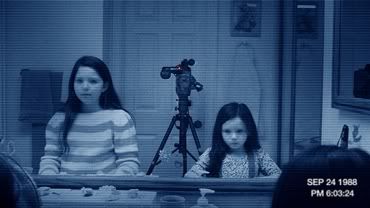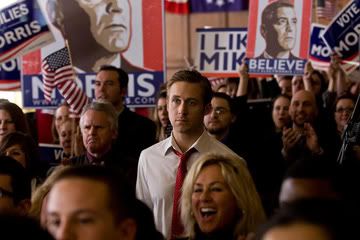
"Paranormal Activity 3" (2011)
It still works. Ariel Schulman and Henry Joost, the directors of last year's controversial pseudo-documentary "Catfish," take the reins of the third installment in the highly popular found-footage horror franchise. And as much as the series has definitely set its own formula by now, "Paranormal Activity 3" does not feel derivative and still gives viewers something to be terrified about. It's clear Schulman and Joost have a sense of humor because this installment gives us new scare tactics that play with audience expectation.
The best of these clever devices is a camera mounted atop the base of a rotating fan. It pans at a deliberate and painfully slow pace between the kitchen and living room giving us a lot of anticipation to chew on before we see the other end of that camera's range. It's a dastardly trick. Along with this camera, there are only two others mounted in bedrooms unlike the second installment which had a whole security system of cameras to watch. The movie is a prequel to the events of the first taking place in September 1988, which explains the lack in technology. This aspect, though, is about the only thing that's period piece material. The high-vaulted ceilings and overall look of the home make it look incidentally quite modern, and the babysitter's outfit is a bit obvious.
But decade accuracy isn't the point here. The story follows Katie (Chloe Csengery) -- of the first film -- as a young girl living with her sister Kristi (Jessica Tyler Brown) and her parents, Dennis (Christopher Nicholas Smith) and Julie (Lauren Bittner). The setting of a prequel is meant to show how Katie initially had an encounter with the evil forces that drove her to the activity of the original movie. Consequently, a lot of the action focuses around Katie and her sister. These girls, however, aren't your typical creepy young girls in horror movies. They're ordinary, everyday young girls. Except when Katie wants to play a scary game of "Bloody Mary," saying it three times could actually bring horrific results. And Kristi's imaginary friend "Toby," who she talks to with intimidated obedience, is the one making noises at night.
"Paranormal Activity 3" causes a larger sense of unsettling dread than even the first two installments. It might be because the looming presence in the house feels more personal and malicious -- and from Kristi it even gets a name. The second movie enlisted jump-out scares to utmost effect. And while this outing still toys with that, it even more effectively finesses pure suspense in moments where nothing even happens. Take the last 15 minutes, for example, which had me literally shaking with anxiety.
These films are, if nothing else, a lesson in restraint when it comes to eliciting scares. Sure there's no restraint when it comes to the number of sequels they're going to keep churning out -- "Paranormal Activity 4" is inevitably on its way -- but I would much rather see eager audiences sitting down to spooky ghost stories than the glib and vile "Saw" splatter-fest which previously dominated Halloween movie season.
My review of Paranormal Activity
My review of Paranormal Activity 2
My review of Paranormal Activity
My review of Paranormal Activity 2







